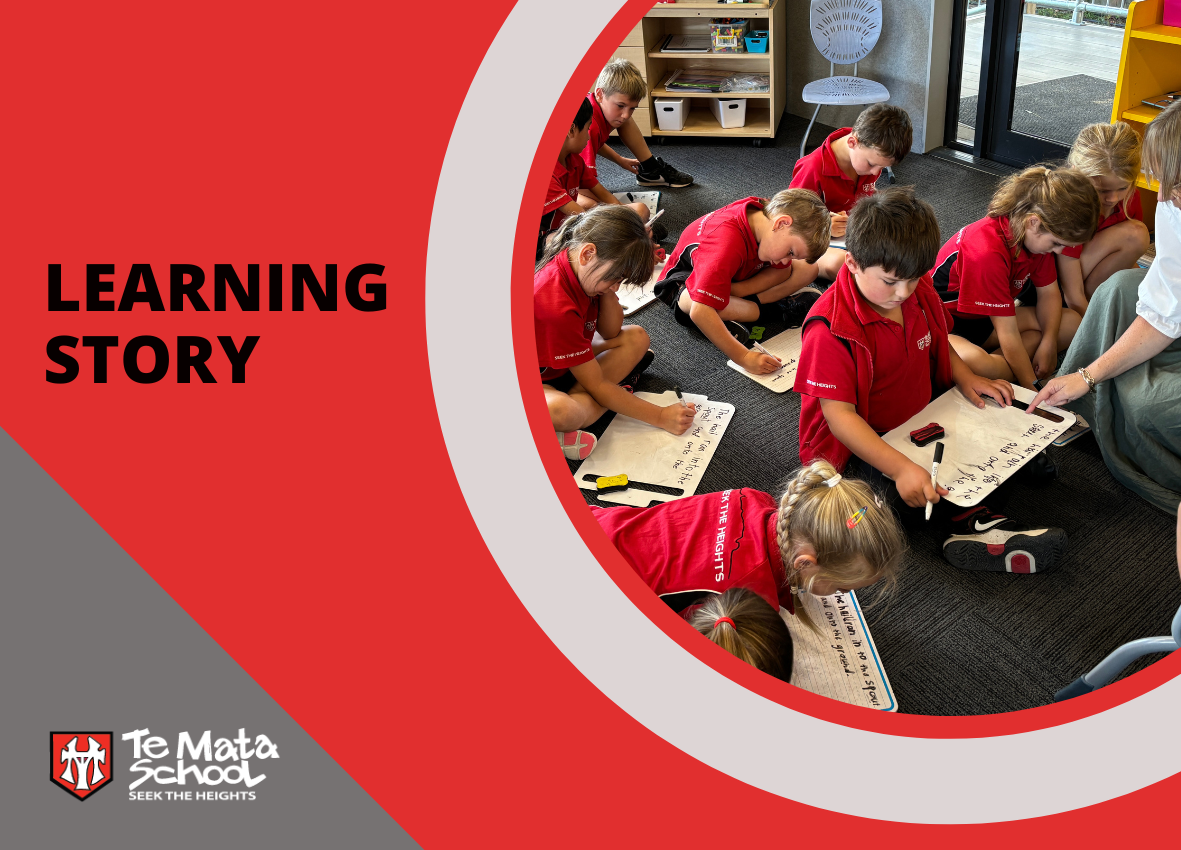


'The Code' Spelling Programme
#Middles&Seniors

Spelling, ‘The Code’.
Often we think of digital tools or inventions and algorithms when we hear the word ‘Code’ or ‘Coding’, however being a successful speller/writer too requires students to learn, apply, practise and review ‘codes’.
One definition for the word ‘Code is, “a system of words, letters, figures, or symbols used to represent others, especially for the purposes of secrecy”. Spelling is filled with secrets unless students are explicitly taught how to spell/apply set rules or codes. At Te Mata School we use ‘The Code’, a systematic approach to teaching spelling (Liz Kane Literacy). Through ‘The Code’ students across our Middle and Senior School (Years 3 to 6) are taken through a series of Structured Literacy lessons that include explicit and systematic teaching of phonemic awareness, the alphabetic principle, spelling and morphology (the study of the forms of things). This year our teachers are supported by Kirsty Tatere from Liz Kane Literacy. She offers guidance and coaching to ensure best practice is occurring when we are teaching ‘The Code’.

What does this look like? Sound like? Feel like? Below is a snapshot from our Middle and Senior School:
Students are actively engaged in structured, explicit lessons linked to ‘The Code Spelling programme’.
Clear support is provided through the use of explicit modelling of rules/codes of spelling by teachers eg: Google Slide Sets on the TV with words to read (decode) and then encode (write/spell).
Students use their phoneme fingers to support them whilst listening for sounds in words (phonemes - developing phonemic awareness).
Students use whiteboards and their writing books to practise spelling codes/rules.
Students are asked to apply their new learning through writing dictated sentences. The focus within these sentences is: to be accurate, to use the correct spelling rule (The Code of the day), to identify and underline code rules and also to correctly use punctuation, making sure that all sentences are correctly composed/written.
Students practising ‘The Code’ via Handwriting activities. With a clear focus on neatness and accuracy of letter formation. The more students write ‘The Code’ the more likely they are to retain it (creating automaticity).
Students apply their knowledge of ‘The Code’ when reading and developing their knowledge of vocabulary - Te Ako Zone have been explicitly making links to what they read: Check out their Seesaw post.

So what do our students think?
“Finding out new code is exciting, it means you can use more words in your learning”.
We write on whiteboards, to practise the Code. “It is fun to write on whiteboards, because if you make a mistake you can rub it out”.
“Our teacher helps us to remember what the spelling rule is doing in words. She teaches us new Code that we are learning. She tells us what to do - we always know what to do”.
“We write sentences, and we can not look at it when writing the sentence. First we read it, then we repeat it back to the teacher, the teacher takes the sentence away as we are writing it. The sentence is put back up on the screen once we are done so we can check our writing” (Dictated Sentences).

Further links and information:
What is a phoneme? “A phoneme is the smallest unit of sound that distinguishes one word from another word in a language.” (Link for parents)
Why is neatness and accuracy important in handwriting? Helen Walls and Christine Braid believe that “teaching students how to automatically write letters leads to better quality writing. When children can form letters easily, they gain memory space to express more interesting ideas.” During the second half of 2023 Helen Walls worked with Te Mata Schools literacy leads, giving feedback on our revised writing progressions (including spelling & handwriting).
What is the Code and who is Liz Kane? https://www.lizkaneliteracy.co.nz/the-code & https://www.lizkaneliteracy.co.nz/about
How has Te Mata School engaged with Liz Kane Literacy? Kirsty Tatere, one of their Literacy Coaches, has explicitly modelled lessons for teachers, demonstrating best practice. She will continue to work closely with our teachers throughout 2024. We have also run a teacher aide professional development course at Te Mata School - Check out the amazing post on Facebook by Kirsty Tatere, on the Liz Kane Literacy Facebook page (Facebook link). As a school we use the Little Learners Love Literacy range of resources which supports the teaching of ‘The Code’ within a reading and writing context. Liz Kane Literacy stocks these resources and provides all professional development within New Zealand linked to these resources.
Article added: Tuesday 12 March 2024


Location